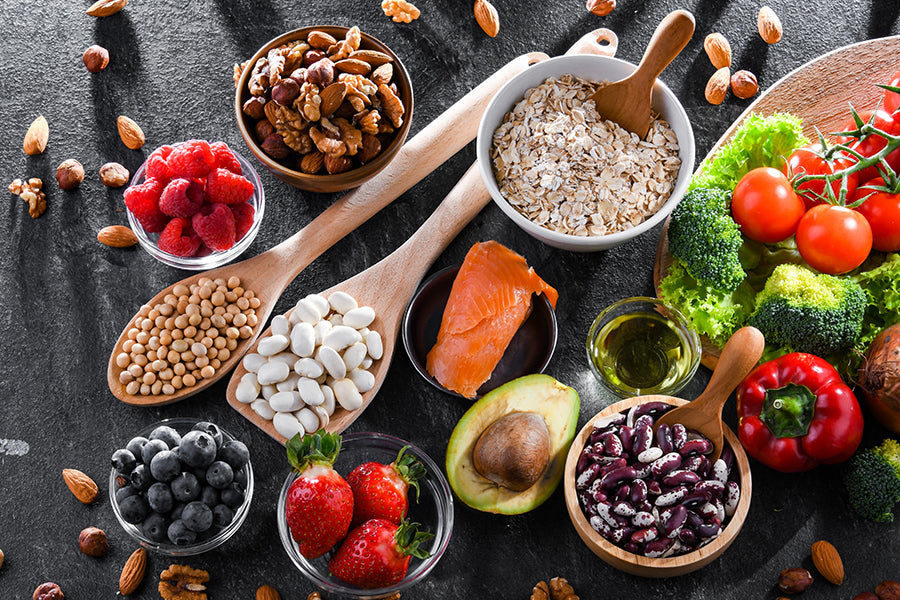Gone are the days when only older generations suffered from high cholesterol and cardiac diseases. Today's unhealthy lifestyle habits including lack of physical activity and poor eating habits have caused even younger generations to suffer from cholesterol related issues. Since having high cholesterol cannot be figured out until symptoms worsen, many people are unaware of their cholesterol levels. As per the 2008 research conducted by the world health organization, 39% of adults suffer from high cholesterol levels, causing 2.6 million deaths in a year around the globe.
Even though genetics play a role in having cholesterol issues, a lot of the credit goes to the poor lifestyle. Therefore, in this article, we have concluded everything you should know regarding good and bad cholesterol levels and a 7-day Low Cholesterol Diet Plan to live healthy and happy.
Before giving you the diet plan, you must understand this disease and how cholesterol levels rise. Then we'll tell you the foods you can incorporate into your diet to control these rising levels, with a fully planned 7-day diet plan to help you control your cholesterol so your heart can keep pumping blood to your organs effectively and efficiently.
Related Article: Why Everyone Should Be Doing Cardio and What Are the Best Exercises to Do
What Is Cholesterol?

Cholesterol is a wax-like fatty substance produced in the liver and is found in our blood and body cells. Cholesterol is not just produced by our bodies but is found in various food items as well that are taken from animals, such as egg yolks, meat, and whole-milk dairy products. Even though it is essential for our good health, too much cholesterol can be dangerous.
How Do Cholesterol Levels Rise?
Further in the discussion of cholesterol, it is important to understand the good and bad cholesterol and how they rise to a dangerous level in our bodies, leading to heart attacks and various cardiovascular diseases.
One-third of cholesterol found in the body is produced inside the liver, and the rest is consumed through our diets. When we consume food, or the liver produces cholesterol, which is then carried in our blood by proteins called lipoproteins.
The two types of lipoproteins that make up total cholesterol in our body are; low-density lipoproteins (LDL) and high-density lipoproteins (HDL), also known as the bad and good cholesterol.

Low-density lipoproteins make up most of the cholesterol found in our bodies. In layman's terms, LDL is called bad cholesterol because high levels of LDL lead to high chances of strokes and heart diseases.
High-density lipoprotein represents a relatively minor part of the cholesterol in the body and is known as good cholesterol. This is because HDL absorbs the cholesterol and sends it back to the liver, which is then flushed out of the system, ultimately lowering the chances of cardiovascular diseases.
An excess of bad cholesterol or LDL in our body starts to build upon the walls of the blood vessels. This build-up, also known as plaque, reduces blood flow to the heart and other organs, leading to angina or heart attacks, etc.
Healthy Foods to Reduce Cholesterol Levels
Now that you understand the difference between good and bad cholesterols and how they can affect your health, here is a list of foods that you can incorporate into your diet to control your cholesterol levels effectively. You can also shed the extra calories and lose fat using the Dmoose Fat Burner which suppresses your appetite and enhances your metabolism.
1. Beans and Lentils

Beans and lentils are rich in soluble fiber and are free of cholesterol. Since beans and lentils are plant-based proteins, they help reduce the body's bad cholesterol or low-density lipoprotein.
For example, red, yellow, green, and brown lentils, chickpeas, kidney beans, runner beans, etc.
2. Food Rich in Healthy Fats
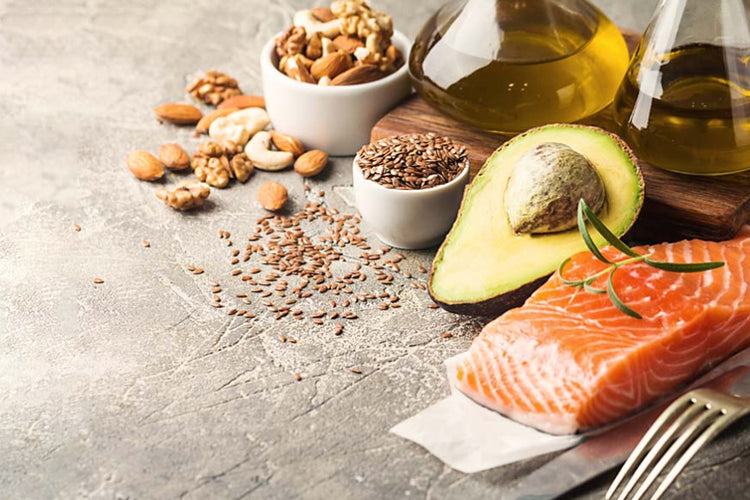
Just like good and bad cholesterol, fats are also classified as good and bad based on different kinds of fat. Food with mono-unsaturated and poly-unsaturated fats is good for the heart as they help increase high-density lipoproteins. For example, avocado, nuts, seeds, olives, salmon, sardines, vegetable oils, spreads, etc.
3. Oats and Barley
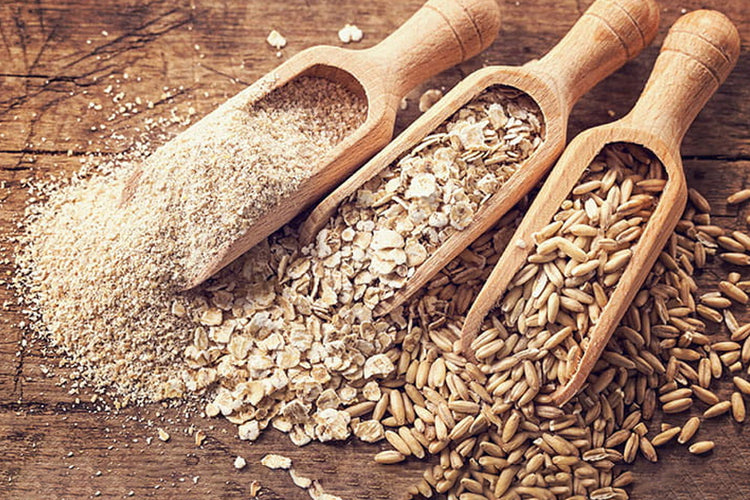
Instead of consuming processed food, add more whole-grain foods wherever possible. Whole-grain foods contain a good amount of soluble fiber called beta-glucan, which helps lower bad cholesterol levels. For example, Oats, barley, brown rice, whole wheat bread, etc., are the best whole-grain foods that you can easily add to your diet to lower the low-density lipoproteins in your body.
4. Fruits and Vegetables
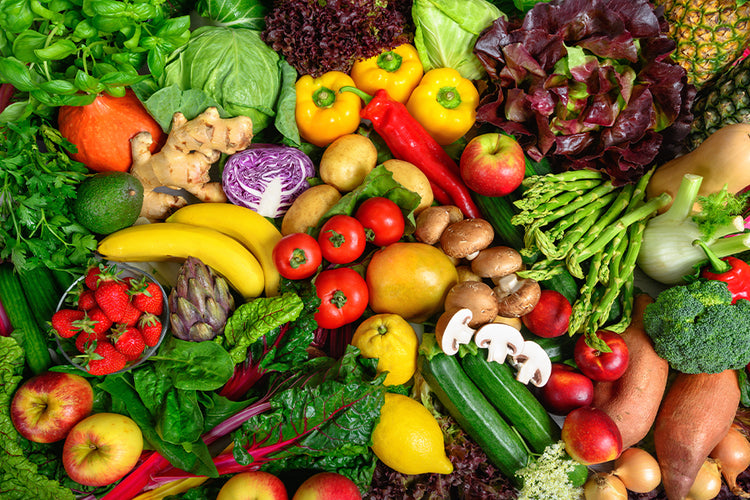
Colorful fruits and vegetables contain substantial amounts of soluble fiber in their skin, which helps protect you against any cardiovascular diseases, lowering cholesterol consumption and reducing LDL levels. For example: consuming carrots and potatoes with their peels, adding orange and lemon peels in salads, etc.
To enhance your dietary changes, consider taking Dmoose multivitamins as a supplement. It can help maintain your vitamin levels and offers additional advantages, making it an excellent complement to your lifestyle.
Related Article: 7 Nutrition Rules You May Be Breaking Without Realizing as a Beginner
5. Nuts
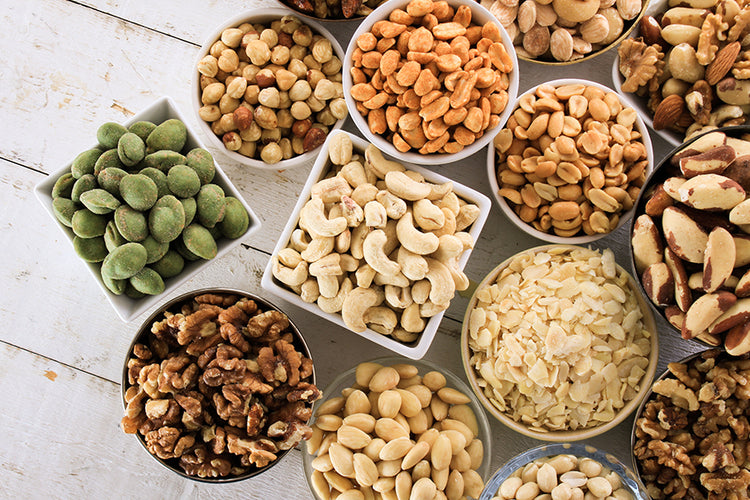
Unsalted and unroasted nuts that are close to their naturally ripe stage are the ones that contain fats and soluble fibers. Those nuts specifically found with skin are great for the heart as they're linked to lowering harmful cholesterol levels and triglycerides.
For example, pistachios, almonds, pecan nuts, cashews, hazelnuts, etc.
Related Article: 8 Things You Need to Know When Starting a New Diet Plan
How to Meal Prep for the Week?
Now that you're well aware of all the things you need to incorporate in your everyday diets and how beneficial they are for you in lowering the harmful cholesterol levels, we've designed a complete 7-day meal plan.
This meal plan contains everything you need to consume throughout the day for an entire week. To make it even easier for you, we've written the calories, fats, proteins, etc. you'll be consuming throughout the day to know exactly what you're eating and how much you're eating.
Monday (Day 1)
Breakfast: (405 calories)
1 serving of Greek yogurt with blueberries, walnuts, and honey
Lunch: (532 calories)
2 hummus and vegetable sandwiches
Supper: (567 calories)
1 serving roasted salmon with 2 servings of green garlic beans
Total calories for the day: 1504 calories
Total Carbs: 58g
Total fat: 84g
Total protein: 78g
Tuesday (Day 2)
Breakfast: (392 calories)
2 servings of spinach, Swiss and egg white omelet with 2 slices of whole-wheat toast
Lunch: (534 calories)
1 serving of tuna stuffed pepper with 1 avocado
Supper: (570 calories)
2 servings of chicken and side veggies
Total calories for the day: 1496 calories
Total carbs: 126g
Total fat: 149g
Total proteins: 138g
Wednesday (Day 3)
Breakfast: (405 calories)
1 serving of Greek yogurt with blueberries, walnuts, and honey
Lunch: (467 calories)
1 serving of basic mixed green salad with peanut butter and celery (4 stalks of celery with 4 tablespoons of peanut butter)
Supper: (501 calories)
2 servings of vegetable stir fry
Total calories for the day: 1493 calories
Total carbs: 103g
Total fats: 84g
Total proteins: 96g
Thursday (Day 4)
Breakfast: (397 calories)
1 serving southwestern eggs with 2 slices of whole-wheat toast
Lunch: (518 calories)
1 simple Caprese sandwich with 1 ounce of almonds
Supper: (589 calories)
2 servings of vegetables and chicken salad
Total calories for the day: 1504 calories
Total carbs: 127g
Total fats: 75g
Total proteins: 88g
Friday (Day 5)
Breakfast: (430 calories)
2 servings of spinach and mushroom breakfast scramble with 1 cup of strawberries
Lunch: (404 calories)
1 serving of chicken and avocado salad
Supper: (679 calories)
2 kidney bean quesadillas tortillas
Total calories for the day: 1513 calories
Total carbs: 120g
Total fats: 62g
Total proteins: 127g
Saturday (Day 6)
Breakfast: (445 calories)
Gordon Ramsay's scrambled eggs
Lunch: (467 calories)
1 serving of basic mixed green salad with peanut butter and celery 4 stalks of celery with 4 tablespoons of peanut butter
Supper: (524 calories)
1 serving of tuna patties with 2 servings of green beans with olive oil
Total calories for the day: 1436 calories
Total carbs: 69g
Total fats: 95g
Total proteins: 87g
Sunday (Day 7)
Breakfast: (443 calories)
1 serving of peach yogurt parfait
Lunch: (426 calories)
2 tomatoes and hummus on rye sandwiches
Supper: (630 calories)
1 chicken wrap with 2 servings of steamed broccoli with olive oil and parmesan
Total calories for the day: 1499 calories
Total carbs: 168g
Total fats: 65g
Total proteins: 75g
Related Article: Gain Lean Muscles: Workout, Nutrition Plan & More
Final Words
Adopting a low-cholesterol diet plan is a powerful tool for beginners to improve their heart health and overall well-being. Throughout this 7-day plan, we have explored a variety of nutritious and delicious meals that can help lower cholesterol levels.
By incorporating whole grains, fruits, vegetables, lean proteins, and healthy fats into your daily meals, you can reduce the intake of saturated and trans fats, which are significant contributors to high cholesterol. Additionally, these foods are rich in fiber, vitamins, and antioxidants, further promoting cardiovascular health.
Reading List
Article Sources
- Aune, Dagfinn, et al. "Fruit and Vegetable Intake and the Risk of Cardiovascular Disease, Total Cancer and All-Cause Mortality-a Systematic Review and Dose-Response Meta-Analysis of Prospective Studies". International Journal of Epidemiology, vol. 46, no. 3, June 2017, pp. 1029-56. DOI.org (Crossref), https://doi.org/10.1093/ije/dyw319.
- Bazzano, Lydia A. "Effects of Soluble Dietary Fiber on Low-Density Lipoprotein Cholesterol and Coronary Heart Disease Risk". Current Atherosclerosis Reports, vol. 10, no. 6, Dec. 2008, pp. 473-77. PubMed, https://doi.org/10.1007/s11883-008-0074-3.
- Berryman, Claire E., et al. "Effects of Almond Consumption on the Reduction of LDL-Cholesterol: A Discussion of Potential Mechanisms and Future Research Directions". Nutrition Reviews, vol. 69, no. 4, Apr. 2011, pp. 171-85. PubMed, https://doi.org/10.1111/j.1753-4887.2011.00383.x.
- CDC. "Heart Disease Resources | Cdc.Gov". Centers for Disease Control and Prevention, 27 Sept. 2021,https://www.cdc.gov/heartdisease/about.htm.
- "LDL and HDL Cholesterol: "Bad" and "Good" Cholesterol". Centers for Disease Control and Prevention, 31 Jan. 2020, https://www.cdc.gov/cholesterol/ldl_hdl.htm.
- "Cholesterol". Www.Heart.Org,https://www.heart.org/en/health-topics/cholesterol.
- Gordon, D. J., et al. "High-Density Lipoprotein Cholesterol and Cardiovascular Disease. Four Prospective American Studies." Circulation, vol. 79, no. 1, Jan. 1989, pp. 8-15. ahajournals.org (Atypon),https://doi.org/10.1161/01.CIR.79.1.8.
- Ha, Vanessa, et al. "Effect of Dietary Pulse Intake on Established Therapeutic Lipid Targets for Cardiovascular Risk Reduction: A Systematic Review and Meta-Analysis of Randomized Controlled Trials". CMAJ: Canadian Medical Association Journal = Journal de l"Association Medicale Canadienne, vol. 186, no. 8, May 2014, pp. E252-262. PubMed, https://doi.org/10.1503/cmaj.131727.
- "HDL (Good), LDL (Bad) Cholesterol and Triglycerides". Www.Heart.Org, https://www.heart.org/en/health-topics/cholesterol/hdl-good-ldl-bad-cholesterol-and-triglycerides.
- Ho, H. V. T., et al. "A Systematic Review and Meta-Analysis of Randomized Controlled Trials of the Effect of Barley β-Glucan on LDL-C, Non-HDL-C and ApoB for Cardiovascular Disease Risk Reductioni-Iv". European Journal of Clinical Nutrition, vol. 70, no. 11, Nov. 2016, pp. 1239-45. PubMed, https://doi.org/10.1038/ejcn.2016.89.
- Indicator Metadata Registry Details. https://www.who.int/data/gho/indicator-metadata-registry/imr-details/3236.
- Li, Siying S., et al. "Effect of Plant Protein on Blood Lipids: A Systematic Review and Meta-Analysis of Randomized Controlled Trials". Journal of the American Heart Association, vol. 6, no. 12, p. e006659. ahajournals.org (Atypon), https://doi.org/10.1161/JAHA.117.006659.
- Mozaffarian, Dariush, et al. "Fish Consumption and Stroke Risk in Elderly Individuals: The Cardiovascular Health Study". Archives of Internal Medicine, vol. 165, no. 2, Jan. 2005, pp. 200-06. PubMed, https://doi.org/10.1001/archinte.165.2.200.
- Padmanabhan, P., et al. "Berries and Related Fruits". Encyclopedia of Food and Health, edited by Benjamin Caballero et al., Academic Press, 2016, pp. 364-71. ScienceDirect, https://doi.org/10.1016/B978-0-12-384947-2.00060-X.
- Peters, Sanne A. E., et al. "Total Cholesterol as a Risk Factor for Coronary Heart Disease and Stroke in Women Compared with Men: A Systematic Review and Meta-Analysis". Atherosclerosis, vol. 248, May 2016, pp. 123-31. ScienceDirect, https://doi.org/10.1016/j.atherosclerosis.2016.03.016.
- Ros, E. "Nuts: Health Effects". Encyclopedia of Food and Health, edited by Benjamin Caballero et al., Academic Press, 2016, pp. 111-18. ScienceDirect, https://doi.org/10.1016/B978-0-12-384947-2.00496-7.
- Sabaté, Joan, et al. "Nut Consumption and Blood Lipid Levels: A Pooled Analysis of 25 Intervention Trials". Archives of Internal Medicine, vol. 170, no. 9, May 2010, pp. 821-27. PubMed,https://doi.org/10.1001/archinternmed.2010.79.






